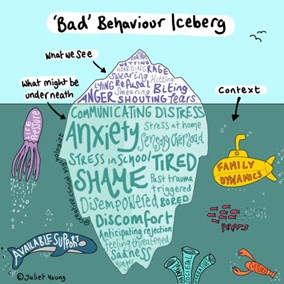Introduce
Self-regulation is the ability to control your own actions without the help of another person. The behaviour of a child can often tell us about what they might be thinking or feeling.

Read: Read the following infographic about what lies beneath the behaviour of a young child.
Juliet Young.2022
By completing this activity, you will understand that children’s behaviour is a way for them to communicate how they are feeling and that sometimes feeling upset, sad, angry and frustrated is a normal part of healthy development.
Behaviour as Communication
A child’s behaviour is an important insight into how they might be feeling. It can be easy to respond to the behaviour that we are seeing without considering what might be going on for that child or what they might be struggling with. The image of an iceberg illustrates this for us:
Develop
Children need to learn to accept and manage all emotions. Every child will experience periods of stress and challenges with feelings that they find difficult to hold. Recognising and accepting these feelings is the first step to being able to express and manage them.

Watch: Dealing with feelings
BBC Bitesize Primary level
Watch this short video below that makes the connections between feelings, emotions and behaviour.
This activity will help you to understand that children’s behaviour is a way for them to communicate how they are feeling and that sometimes feeling upset, sad, angry and frustrated is a normal part of healthy development.
One way of managing behaviour is to remind children that all feelings are OK but not all behaviour is. So, it’s OK to feel angry but it isn’t OK to hurt yourself or anyone else. It is important that children learn to separate their feelings and behaviour so that some emotions don’t become forbidden or bad. This will need to be role modelled by the adults around them.
Building your knowledge and understanding of self-regulation strategies can help you to support young children to develop this important skill.

Read: The Most Important Life Skill to Teach Children: Self-Regulation
Ashley Soderlund Ph.D.
Read this blog about the important skill of self-regulation. This activity will help you to understand that children’s behaviour is a way for them to communicate how they are feeling and that sometimes feeling upset, sad, angry and frustrated is a normal part of healthy development.
Reflect

Stop and Reflect:
After reading through the above, reflect on the following:
- Could you recognise a young child’s behavioural responses to emotions?
- How can you model acceptable ways to deal with emotions?
- How can you support and encourage young children to regulate their behaviour?
Further Resources







